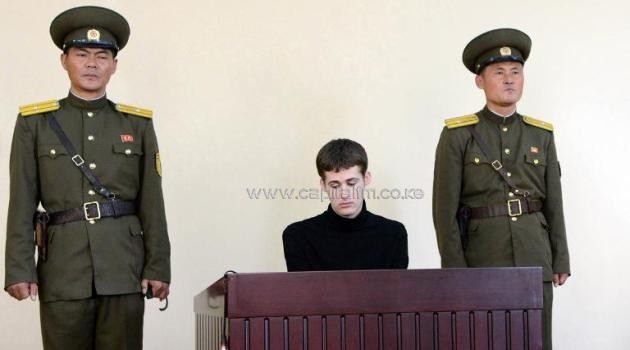
US citizen Matthew Miller (C), who was sentenced to six years of hard labour for “hostile” acts against Pyongyang, pictured on September 14, 2014 at the North Korean Supreme Court in Pyongyang/AFP
SEOUL, September 16- North Korea’s use of captured or detained Americans to score propaganda points and extract political concessions from Washington has a long history stretching back to the Cold War, but analysts say the tactic may be wearing thin.
The isolated state currently has three American citizens in detention — Kenneth Bae, Matthew Miller and Jeffrey Fowle.
In a recent television interview with CNN that was set up by the North Korean authorities, all three pleaded for Washington to help secure their release.
On Sunday, Miller was sentenced to six years’ hard labour for “hostile” acts against the regime, four months after he was arrested for allegedly ripping up his tourist visa at immigration.
Bae, a Korean American described by Pyongyang as a militant evangelist, was sentenced last year to 15 years of hard labour for seeking to topple the North’s regime.
Fowle, who entered the North in April as a tourist, is expected to be tried soon, following his arrest for reportedly leaving a Bible at a hotel.
The arrests and the severe sentences handed down so far — coupled with the access granted to US media — have been seen as an effort by an attention starved Pyongyang to secure a high-level US visit to negotiate their release.
The propaganda benefits of such visits are obvious, allowing the North to portray Washington as coming cap in hand to plead for North Korean largesse.
They also provide a rare moment of direct contact that the North can use to push other issues, such as the resumption of six party talks on its nuclear programme.
– ‘Hallmark’ North Korean tactic –
“Brinkmanship, including hostage diplomacy, has long been a North Korean hallmark,” said Bae Han Dong, professor of political science at Kyungpook National University.
The earliest example of this strategy was the capture of the US spy ship USS Pueblo in 1968.
North Korea held the more than 80 crew members for nearly a year, as the two sides engaged in tortuous negotiations over their release.
That finally came after a formula was worked out in which the US signed a document “solemnly” apologising for “grave acts of sabotage”, while simultaneously and publicly repudiating the statement as false.
The USS Pueblo is now a centrepiece exhibit at the massive Korean War museum in Pyongyang.
Hong Seuk Ryule, history professor at Sungshin Women’s University in Seoul, said the Pueblo incident helped the North establish itself as a legitimate state capable of negotiating directly with the United States.
“It also established a bizarre political formula between the North and the US that talks are arranged only after some kind of hostile crisis,” Hong wrote in his 2012 book on the political history of the peninsula.
– Clinton, Carter missions –
The trend of US visits began in the 1990s as various US citizens were detained in the North despite the State Department strongly advising nationals against travelling there.
In 1996, US Congressman Bill Richardson visited and brought home American Evan Hunziker, who had swum naked and drunk across the Yalu River from China to North Korea, where he was arrested and charged with spying.
Former US president Bill Clinton in 2009 made the same trip to secure the release of two American women journalists sentenced to 12 years’ hard labour for illegally crossing the border.
And in 2010 former president Jimmy Carter personally obtained the release of Aijalon Mahli Gomes, who had been given eight years’ hard labour for illegal entry.
Washington labelled the Clinton and Carter visits as private humanitarian missions, but North Korea announced them as official trips and said both former presidents had offered profuse apologies.
Clinton met with then leader Kim Jong Il, while Carter also held talks — although in both cases North Korea came away with little to show for the process in diplomatic terms.
Bae Han-Dong said Pyongyang was clearly trying to ratchet up the pressure to secure another visit over the three Americans currently being held.
“But the US and the Western world in general have become too familiar with this pattern,” Bae said.
“The North should realise that such tactics are reaching their limit and are more likely to deepen the North’s isolation.”
The US focus, meanwhile, is on crises elsewhere, notably in the Middle East where two captured US journalists have been gruesomely executed in recent weeks by Islamic militants.
“It is increasingly clear that (North Korea) seeks to use these three US citizens as pawns to pursue its own political agenda,” State Department spokeswoman Marie Harf said Monday.
In a recent memoir based on his tenure as senior director of Asian affairs on the National Security Council under President Barack Obama, Jeffrey Bader also voiced frustration with those citizens who found themselves in North Korean jails.
“We felt considerable irritation at American innocents abroad who stumble into such situations as if they were in downtown LA and then expect to be saved, without regard to the damage they do to US national security interests,” Bader wrote.









































